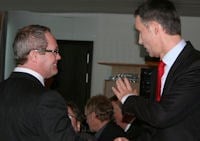Expert group suggests additional measures to reduce sick leave
Historical archive
Published under: Stoltenberg's 2nd Government
Publisher: Ministry of Labour
Press release | No: 06 | Date: 03/02/2010 | Last updated: 27/08/2010
The government received suggestions today from the expert group that has considered measures that could reduce sick leave. The group proposes a main strategy for the future that prioritises active participation measures, return-to-work strategies and graduated sick leave.
The government received suggestions today from the expert group that has considered measures that could reduce sick leave. The group proposes a main strategy for the future that prioritises active participation measures, return-to-work strategies and graduated sick leave. Partial sick leave should be the main rule for absence due to illness, and people on sick leave should be followed up more closely and sooner.
 Head of the expert group, Arnstein Mykletun, talking with Prime Minister Jens Stoltenberg. |
“Wages should still be paid in full during illness and the employers’ total costs should not be increased. At the same time, there is a broad-based agreement on the need to reduce sick leave. Sick leave rates are too high and the growth in the last year is worrisome. The expert group’s suggestions provide a lot of important input to our joint discussions with employers and employees about a new IA agreement”, says Prime Minister Jens Stoltenberg.
”We have a good and constructive dialogue with employers and employees. I therefore believe that we will be able to agree on the next steps to take within the deadline we have set for ourselves”, says Secretary of Labour Hanne Bjurstrøm.
The expert group proposes:
- That graduated (partial) sick leave shall be the main rule after eight weeks. This shall be combined with a change in the rules for employer financing in the sick pay period, better follow-up of doctors/sick leave-certifiers, both through preparation of expert guidelines for the sick leave work and through systematic feedback about their work practices, as well as mandatory courses for all sick leave-certifiers.
- Studies to ascertain how we can avoid the use of sick leave to compensate for loss of income not linked to illness or injury, but that is due to unemployment or lay-offs.
- Systematic work to improve the knowledge basis for measures.
- Implementation of an information strategy aimed at creating acceptance for the basic ideas behind the proposed measures.
- Strengthening NAV’s control efforts as regards sick pay fraud.
“I note that the suggestions for closer and faster follow-up of people on sick leave and expert guidance for sick leave-certifiers, largely resemble suggestions that are already on our agenda for discussion with the parties”, says Bjurstrøm.
Through the letter of intent on an inclusive working life (the IA agreement), the government is working with employers and employees to ensure a more inclusive working life for the benefit of individual employees, workplaces and the Norwegian society. The aim of the agreement is to contribute to a reduction in sick leave and disability pensions, and that the individual’s resources and work ability are developed and utilised in active work.
In the winter of 2010, employers, employees and the government will discuss the establishment of a new IA agreement and other measures to reduce sick leave. The long term goal is to have the new agreement in place by 1 March.